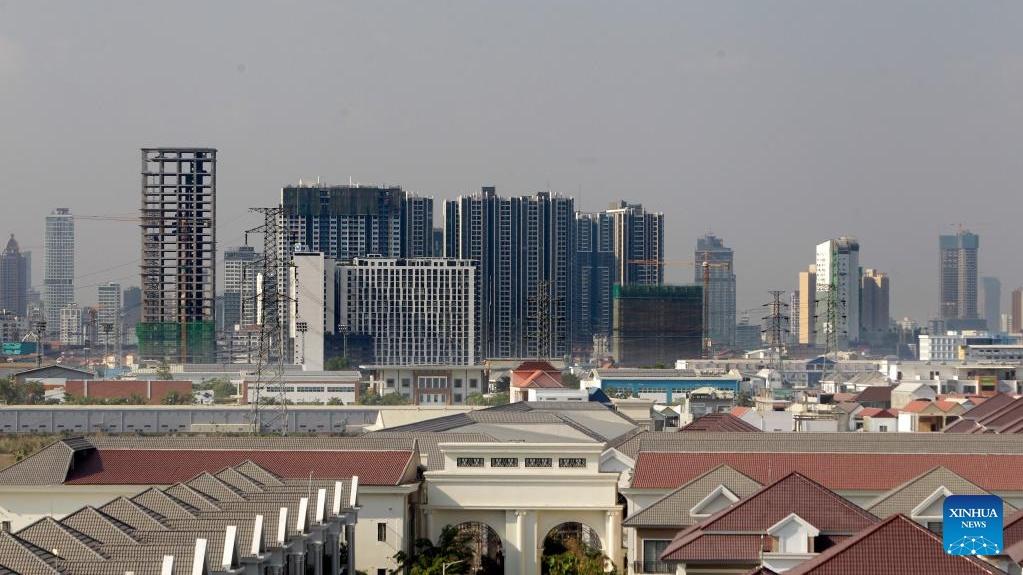 This file photo taken on March 3, 2022 shows high-rise buildings in Phnom Penh, Cambodia. (PHOTO / XINHUA)
This file photo taken on March 3, 2022 shows high-rise buildings in Phnom Penh, Cambodia. (PHOTO / XINHUA)
Cambodia’s economy is forecast to be the fastest-growing in the Association of Southeast Asian Nations (ASEAN), according to the latest outlook by the International Monetary Fund.
In the World Economic Outlook published on Oct 10, the IMF projected that Cambodia’s real GDP will grow 5.6 percent in 2023 and 6.1 percent in 2024, up from the 5.2 percent growth recorded in 2022.
This means that the kingdom is likely to become the fastest-growing economy in the 10-nation bloc for two consecutive years.
Under the RCEP, Cambodia exported $5.26 billion worth of goods to other member countries in the first eight months of 2023, up 22 percent from last year
Cambodia’s growth was closely followed by the Philippines, whose economy is expected to grow 5.3 percent in 2023 and 5.9 percent in 2024.
ALSO READ: Cambodia stresses need to maintain ASEAN centrality
Indonesia’s economy is estimated to grow 5 percent for both 2023 and 2024, while the Lao economy is projected at 4 percent for both years. Growth of Myanmar is expected to be stable for 2023 and 2024 at 2.6 percent.
Vietnam is expected to grow by 4.7 percent this year and 5.8 percent next year, while the predicted growth for Malaysia is 4 and 4.3 percent, respectively.
Thailand’s economy is expected to grow 2.7 percent this year and 3.2 percent next year.
Singapore’s economic growth will slow to 1 percent in 2023, down from 3.6 percent in 2022, but will rebound slightly to 2.1 percent in 2024.
Brunei’s economy is expected to contract by 0.8 percent this year, an improvement from its 1.6 percent contraction in 2022. The IMF expects Brunei to regain its growth momentum to 3.5 percent in 2024.
ALSO READ: Chinese-invested expressway vitalizes Cambodia's economy
Several reasons are behind Cambodia’s economic growth, according to Thong Mengdavid, a research fellow at the Asian Vision Institute, a think tank based in Phnom Penh.
“The recovery of export-oriented manufacturing sectors such as the garment industry … is a crucial contributor to Cambodia’s economic growth in the post-pandemic era,” Mengdavid told China Daily.
The full implementation of the Regional Comprehensive Economic Partnership (RCEP) and the Cambodia-China free trade agreement also improves competitiveness and encourages bilateral and regional trade, as well as investment diversification of Cambodia’s agricultural goods, said Mengdavid.
Both the RCEP and free trade agreement have been in effect since January 2022.
Cambodia exported $16.94 billion worth of goods in the first nine months of 2023, a slight year-on-year drop of 0.8 percent from $17.07 billion, according to Xinhua News Agency, citing data released by the kingdom’s General Department of Customs and Excise’ on Oct 10.
ALSO READ: Cambodia emphasizes need to enhance ASEAN connectivity
The kingdom's exports to China increased by 18.3 percent during the January-September period this year.
Under the RCEP, Cambodia exported $5.26 billion worth of goods to other member countries in the first eight months of 2023, up 22 percent from last year, another report by the Ministry of Commerce showed.
Other key economic drivers include the influx of international visitors and the government’s effective revenue administration and fiscal management, said Mengdavid.
“The IMF evaluation on ASEAN countries reflects the reality of ASEAN challenges,” said Mengdavid, noting it can be used as the basis for ASEAN countries and institutions to further enhance cooperation to build resilient, sustainable, and inclusive growth.
READ MORE: RCEP 'a driving force for global economy' in post-virus era
For the overall world economy, the IMF expects the growth to slow from 3.5 percent in 2022 to 3 percent this year and 2.9 percent next year, a 0.1 percentage point downgrade for 2024 from the IMF’s July projections. This remains well below the historical average.
“The global economy is limping along, not sprinting,” said Pierre-Olivier Gourinchas, an IMF economic counselor and director of research.
Stressing the importance of multilateral cooperation in helping countries achieve better growth outcomes, Gourinchas said countries should avoid implementing politics that contravene World Trade Organization rules and distort international commerce.


